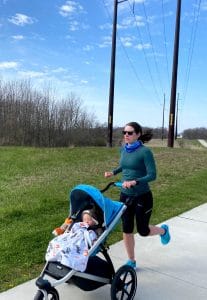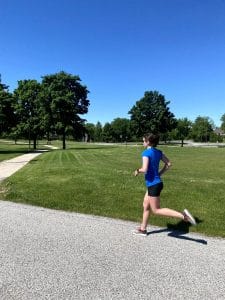Stress: being subject to pressure or tension.
As moms, we are very familiar with stress. It can bubble up with our never-ending to-do list, behavioral issues with our kids, or never-ending wake-ups when we were planning to run early. The list goes on.
But stress is an ingredient for growth. Objects under stress can become stronger. The key is to not undergo too much. To grow, we must balance stress with rest.

Running coach and new mom, Laura Norris of lauranorrisrunning.com (a must-follow site!), understands this well. When she first started running postpartum, she was rebuilding strength and endurance after a C-section, all while chasing around a very mobile and curious baby. She learned she could not handle two hard workouts per week, as she could before her pregnancy. At first, even one quality workout per week left her feeling wrecked. She was reminded on a personal level a fundamental lesson in training: stress is only as good as recovery.
Now training for her first postpartum marathon, she’s careful in concentrating her stress into one or two hard days per week – with the rest of the days as truly easy training days. How does she do this? Well, Laura is nice enough to share her secrets of how to concentrate stress for optimal training in her guest post below. Her running tips will help you work hard and recover well so you can be your best.
How to Concentrate Stress for Optimal Training
Running faster and building endurance are the result of adaptation. You apply specific stressors in training and the body adapts in response if it has the ability to recover. Essentially, adaptation = stress + rest. Too much stress and too little rest, and you do not fully adapt to your training.
This is true for any runner, but especially for a mother runner. If you are within your first year postpartum, your body is still recovering from pregnancy and labor/delivery. Even when you are recovered from the pre- and postnatal demands on your body, you are likely balancing motherhood and work with your training. You have to make your training matter, both from the perspective of rest and stress.
Recovery is vital, particularly sleep, nutrition, rest days, and easy runs. Concentrating and limiting the stress side of the equation is also important.
You want to concentrate stress appropriately so that you can also recover appropriately. This is the principle of keeping your hard days hard and easy days easy – and there are some practical approaches you can take to optimize that principle in your training.
Concentrating stress is also beneficial in terms of time-efficiency. Training as a mom requires smart use of time. If you can concentrate your hard efforts together (such as one hard workout per week, sans stroller), you can achieve a better balance of training and motherhood.
So just how do you concentrate stress in your training?
Double up a Quality Workout and Strength Training
Just like running, strength training produces adaptations by applying stress to your musculoskeletal system. Lifting weights on easy days is not always ideal, particularly if you are running multiple long or hard workouts per week. The practical solution is to lift weights on the same day of your quality runs (ideally, after the run, not before). Your hard days will be hard – and your easy days can be focused on allowing your muscles time to recover. You can either brick the workouts together or run in the morning and lift in the afternoon (here’s how to effectively complete a two-a-day workout).
Related: At-home 30-minute strength plan

Run a Combo Workout
I love combo workouts, especially during marathon training. A combo workout essentially combines two physiological purposes into a single session. You get the benefit of both a tempo run and intervals, for example, without the fatigue of two hard workouts in a week. Combining your workout also allows more runs to focus on aerobic development – something a majority of runners can benefit from.
What does a combo run look like? You do not simply mash together two sessions (like a four-mile tempo AND 6 x 800 on the track). Instead, you balance elements of both while maintaining an appropriate volume of intensity. The percentage of each may be relatively equal (10 x 1-minute hard/1 minute easy + a 10-minute fast finish) or favor one stimulus over the other (such as a tempo and short-interval combo run). Most runners can always develop their leg speed better, so you can create a combo workout by slightly shortening your main workout and finishing with a set of 20-30 second surges.
Run a Workout within Your Long Run
One particular type of combo workout is a long run workout. The half marathon and beyond requires the ability to run relatively fast for a prolonged period of time. One of the most effective ways to train this is to incorporate workouts into your long run. This long-run workout replaces one of the other hard workouts in the week (if you traditionally do a speed workout and tempo run). Typically, you fold a bit of race pace running into the long run; however, you can also take a fartlek-style approach.

Not every long run should be a workout. If you are a novice to the race distance (such as your first marathon), you are best sticking to time-on-feet long runs. Even experienced runners should reserve workouts in long runs for only once every two to three weeks during a training block. Workouts in long runs apply a heavy dose of physiological stress; you want to be adapted to long runs and hard workouts before attempting these.
Related: The scientific benefits of a long run
Chill Out on Your Easy Runs
Running moderately on your easy runs diminishes the benefits, especially as the stress accumulates over time. You will adapt better to your hard workouts and overall training load if you run truly easy on your easy days. An easy run should apply a minimal amount of training stress. You should finish feeling refreshed, not tired.
Laura Norris is an RRCA certified running coach, author of the running blog “Laura Norris Running“, and mother runner of one. She has qualified twice for Boston and races at an age-group competitive level in local races. She coaches dozens of runners with an emphasis on cultivating personal potential through sustainable, enjoyable running.
PS-Laura and I love to help you reach your running goals whether it be to run your first 5k or run competitively! Email me at [email protected] with questions or check out my Coaching Services page!
